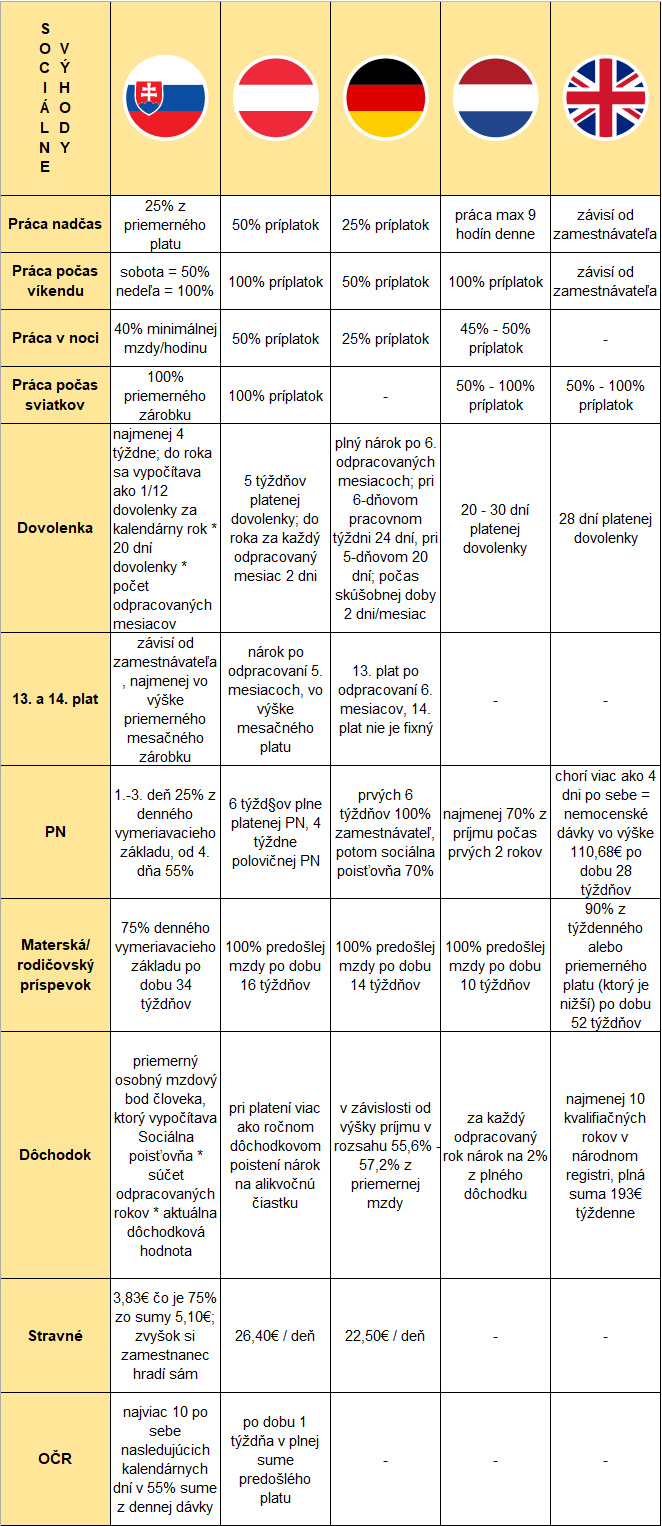In which state is the better paid parent? Where can you apply for a maximum of holiday days? How does sick leave work in individual countries? And how is paid work on weekends or holidays? We know where it pays to work best.
In the past period, we have listed which social benefits you are entitled to with your employer if you work in England, Germany, Austria, the Netherlands and, last but not least, in Slovakia. Every nationality has both its positives and negatives when granting social benefits. In general, we are talking about money outside the agreed monthly wage as compensation for difficult working conditions compared to other employees. It is important to have a general overview of the financial benefits that apply to you. We will help you decide where to work with the best benefits.
Overtime
Many people find it difficult to work beyond their working hours and at the same time unacceptable if they have a family to look after. In Slovakia, an employee may work a maximum of 8 hours of overtime within one working week only if his employer instructs or agrees to it. If you work in Austria and work more than 40 hours per week, you will receive a 50% surcharge for each overtime worked, but it can be a maximum of 20 hours per week.
In Germany, you can extend your working hours from 8 hours to a maximum of 10 hours per day, for which you can receive a surcharge of 25% of your salary. Work in the Netherlands must not exceed 55 hours of overtime per week. In the United Kingdom, overtime is valued at 1.5 times the standard wage, but ultimately depends on the employer to pay you.
Work on weekends, at night and on holidays
Working over the weekend, at night or on holidays is not pleasant to anyone. Fortunately, this work is awarded a surcharge. A Slovak employee receives 50% of the minimum wage per hour for work on Saturday and 100% of the minimum wage per hour for work on Sunday. Night work is set at 40% of the minimum wage per hour and holiday work is 100% of the employee’s average earnings. In Austria, employees receive a 100% bonus for work on weekends and public holidays, and 50% of the basic salary for night work.
Employees in Germany can receive a 50% extra pay for work over the weekend and 25% of the basic pay at night. Working on public holidays is prohibited in Germany. If you work in the Netherlands on weekends, you can get a bonus of up to 100% of your salary, night work up to 45-50% and work time on holidays you can get between 50% and 100%. In England, you may receive a bonus of between 50% and 100% of your basic salary for working on public holidays, but you do not automatically have the right to do so – depending on the employment contract. Working on weekends and at night depends on an agreement with the employer.
Holiday
It has not yet happened that one does not long for at least a day off. The basic length of holiday in Slovakia is at least 4 weeks. For an employee who reaches 33 years by the end of the year is at least 5 weeks. For those who work with the employer for less than a year, the holiday is calculated as 1/12 of the annual holiday * 20 days of holiday * the number of months worked. In Austria, an employee is entitled to leave during the first six months, depending on the duration of his employment, and for each month worked 2 days of leave. From the second year on, he / she is entitled to a full holiday of at least 5 weeks, after 25 years of work he / she is entitled to 6 weeks.
In Germany, the employee is fully entitled to leave after six months of work. He is entitled to a minimum of 24 days of holiday for a 6-day working week, and a minimum of 20 days of holiday for a 5-day working week. A Dutch employee is generally entitled to 20-30 days of leave, regardless of wage, to a minimum holiday benefit of 8%. Employees on an English contract are entitled to at least 5.6 weeks, which is 28 days of paid leave.
Annual wage suppliment
In Germany, the employee is not fully entitled to leave after six months of work.
Sick leave
You know the feeling when a flu begins to limit your life, then a sore throat and finally you need to stay in bed with fever. In Slovakia, in the event of illness, the employee pays the employer for the first 10 days of sick leave, and from the 11th day the social insurance company. The employer pays 25% of the daily assessment base on days 1-3 and 55% of the daily assessment base from day 4. In the case of an illness in Austria, an employee is entitled to regular benefits during the working year for 6 weeks of full sick leave and 4 weeks of half sick leave. If an employee needs to stay in Germany, the employer pays 100% of the regular wage for the first 6 weeks, then the social security fund 70% of the regular wage. Under Dutch legislation, in the event of an employee’s illness, the employer continues to pay at least 70% of the salary (within two years).
If you work in England and are ill for more than 4 days in a row (including holidays), you may receive £ 94.25 (€ 110.68) of sickness benefits from your employer weekly for a maximum of 28 weeks. This dose is not paid for the first 3 days of illness. Doctor’s confirmation is usually required only from day 8 of absence from work. Until then, own testimony is sufficient.
Maternity leave
A woman is entitled to maternity leave in Slovakia for 34 weeks after working 270 days before giving birth. The amount of maternity benefit is 75% of the daily assessment base per calendar day. The protection period for pregnant women in Austria starts 8 weeks before the expected birth of the baby and ends 8 weeks after it, which represents a wage of 100% for 16 weeks. During this period, the woman may not perform her work, but the employment continues and the maternity benefit is paid instead of the salary. Maternity leave in Germany usually starts 6 weeks before the expected date of delivery and ends 8 weeks after delivery. The mother is paid a salary of 100% of her regular salary for 14 weeks.
The maternity leave in the Netherlands lasts 10 weeks, with the government paying 100% of the mother’s income. It can start as early as 6 weeks, but no later than 4 weeks before the planned birth and continues after birth until the indicated 16 weeks. Every woman working in England is entitled to 52 weeks of maternity leave. The first 6 weeks receive 90% of the average weekly salary or 90% of the average salary for 33 weeks (whichever is lower)
Retirement
Maybe you are a few years away from retirement today, maybe you have it around the corner, but in the end we all have the same question – how much will we be getting into our account during this period? In Slovakia, the guaranteed pension for 30 years of service is 33% of the gross average wage from 2 years ago. For 31 to 39 years of pension, the pension increases by 0.02 times the subsistence level and from 40 years by 0.03 times the subsistence level. If you have been paying pension insurance in Austria for more than 1 year, the employee will be entitled to an aliquot amount of the Austrian pension.
The amount of pension in Germany varies depending on the amount of income, which may look in the range of 55.6% – 57.2% of the average wage. The pension in the Netherlands is calculated from the first pillar from the age of 67. You are entitled to 2% of your full pension for each year you work. You are entitled to a full pension after the 50’s. You will need at least 10 qualifying years in your national register (not necessarily consecutive) to earn any state pension in England. The full amount of the new state pension is then £ 164.35 (€ 193.00) per week.
Food allowance
It is said that who eats well does not argue. Certainly this also applies to in-service meals. In Slovakia, an employee is entitled to a subsistence allowance of at least EUR 3.83, which is 75% of EUR 5.10. The rest is paid by the employee himself. In Austria, employees receive € 26.40 per day. In Germany, this contribution is worth € 22.50 per day. In the Netherlands and England, the employee pays the food himself.
Family member care
Not all states provide for family member treatment by law. With us selected employee can apply in Austria or naturally in Slovakia. If you take care of a family member living with you in Austria, you may be given leave while still paying your salary, subject to certain conditions. Care leave is provided for 1 week. If you need to use this service in Slovakia, the entitlement to nursing care lasts at most 10 calendar days in 55% of the amount of the daily assessment benefit. The need itself may last longer, but no longer requiring a dose.

So where is the best place to work?
As everything in life has its pros and cons, even now it is no exception. Ultimately, each country has a positive financial benefit for employees. However, some states do not pay the benefits listed by us and the employee must pay for them himself. From our point of view, work in Austria would be ideal, because all the benefits mentioned above were paid by the employer in a relatively high amount. It also provides a high number of days off during sick leave, maternity or leave. Do not hesitate to check out our current vacancies (not only in Austria) and see for yourself. Contact us to help you find a tailored job.







